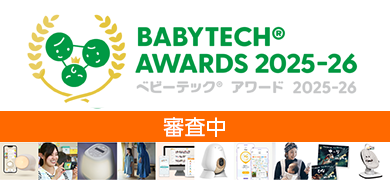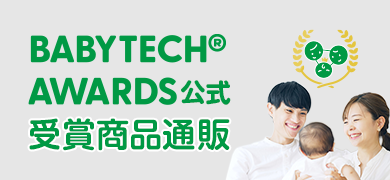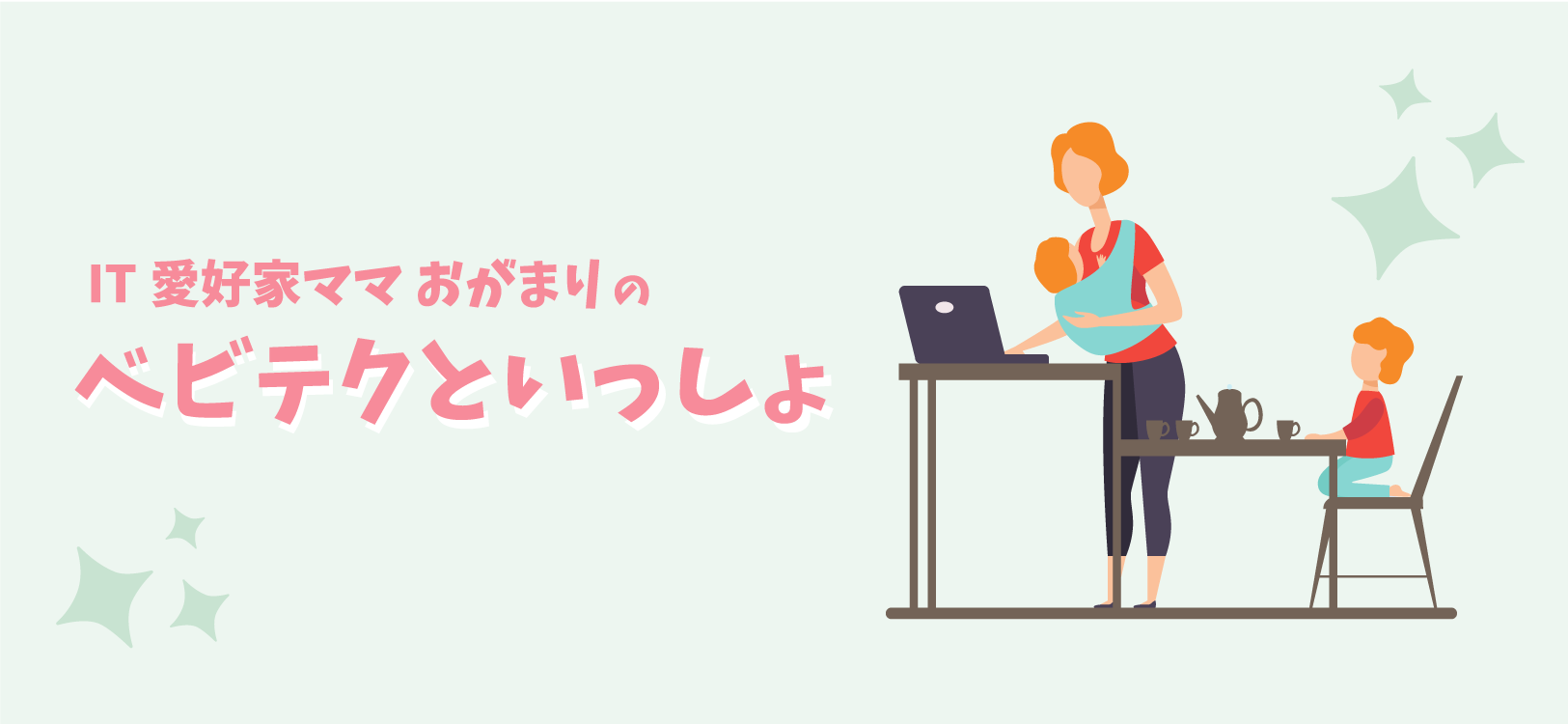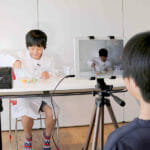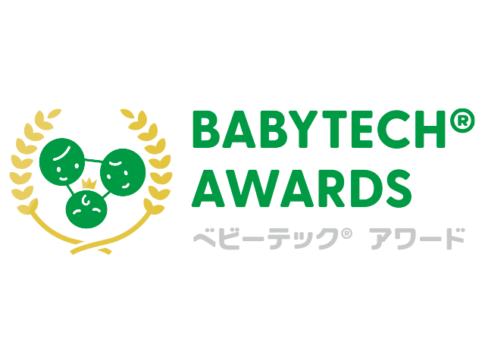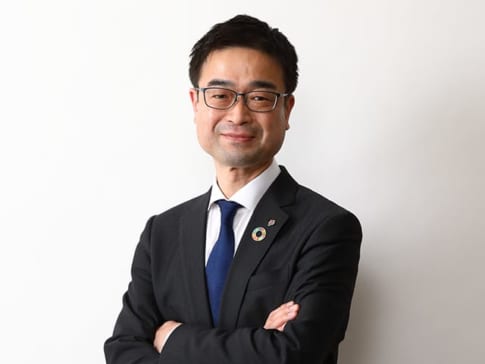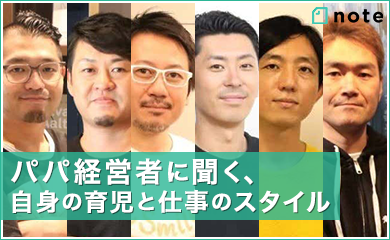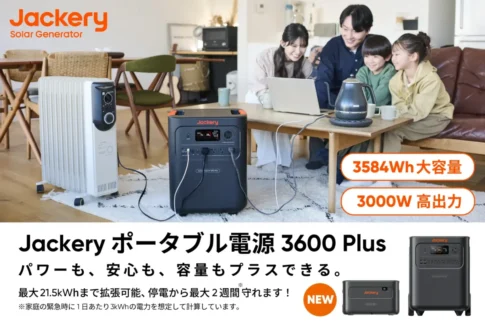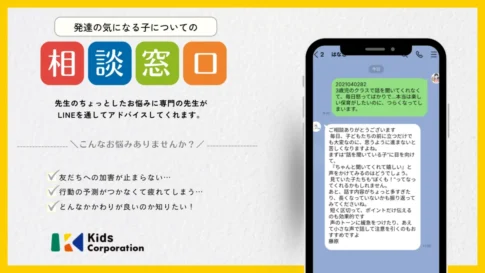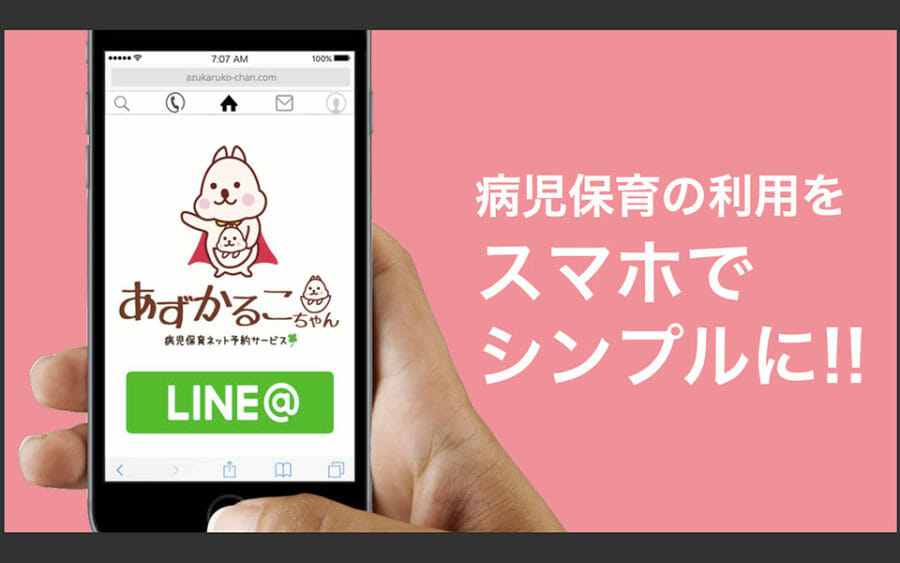
- Provide necessary information on "sick child care," which has not been well known to the public, in a centralized manner.
- ICT is expected to improve "convenience" and "facility utilization rate" of sick child care
- Providing an optimal environment for children with health problems" and "supporting parents' employment
(We spoke to...)
CEO, CI Inc.
Masaki Sonoda
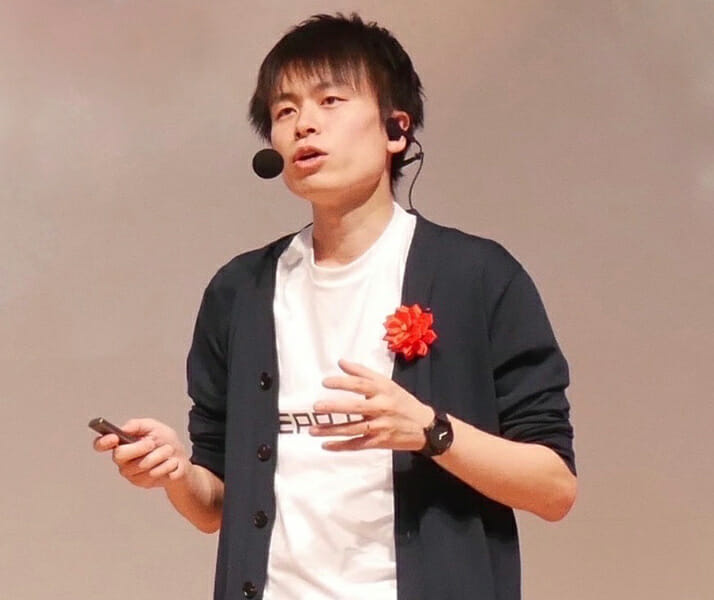
What is the current state of "sick child care," which is surprisingly little known?
Editorial:First of all, could you tell us about the current situation of "sick child care"?
Sonoda:Sick children" are children with minor illnesses such as a cold or influenza that cannot be taken care of at daycare centers. Our services are provided at "sick child care facilities" that take care of such children. At these facilities, nursery school teachers and nurses are on hand to provide both "care for the sick" and "childcare," and some facilities even have a hospital attached to them. There are actually about 1,750 facilities with such specialists throughout Japan.
Editorial: Is there that much!
Sonoda: Yes. However, according to a survey of parents conducted by our company, 751 TP6T of parents answered that they "do not know" or "only know the name" of sick child care, and only 121 TP6T of parents have actually used sick child care services. Therefore, one of our goals is to increase "awareness" of sick child care.
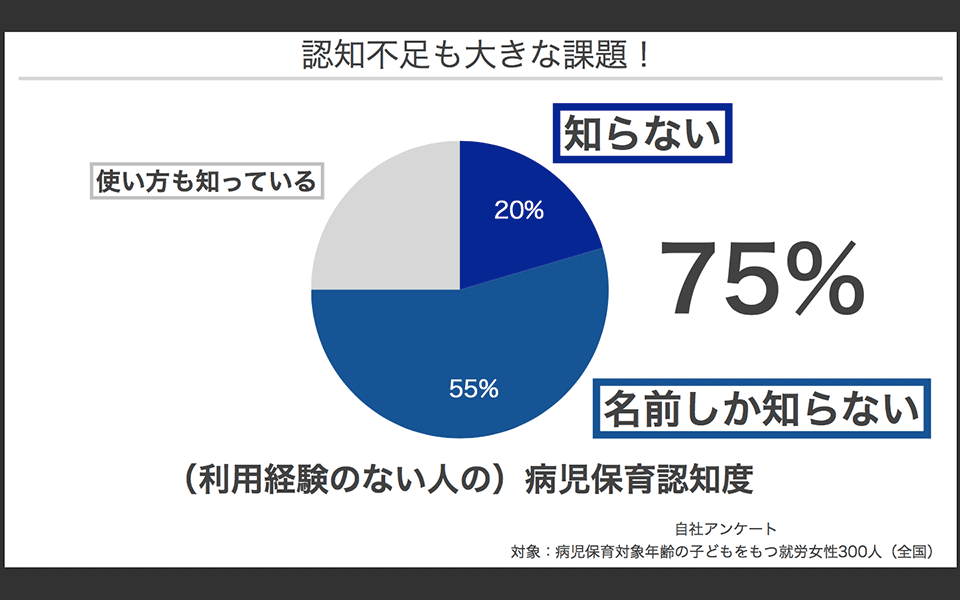
Sonoda:The biggest challenge in the sick child care sector is the low utilization rate of facilities; according to a survey conducted by the Cabinet Office five years ago, the utilization rate of sick child care facilities was about 30%.
Editorial:I see that 70% of the facilities are not being used. ......
Sonoda:One possible reason for the lack of use is the complexity of the procedures for using the service. Please see the "Flow of Using Childcare for Sick Children" below. To begin with, you must "pre-register" with the facility before your child becomes ill in order to use the service. Moreover, this registration is changed every fiscal year, so you need to re-register every year. In other words, guardians who find out about sick child care after their child has a fever cannot basically use the service on the same day. Furthermore, these systems and rules differ from municipality to municipality.
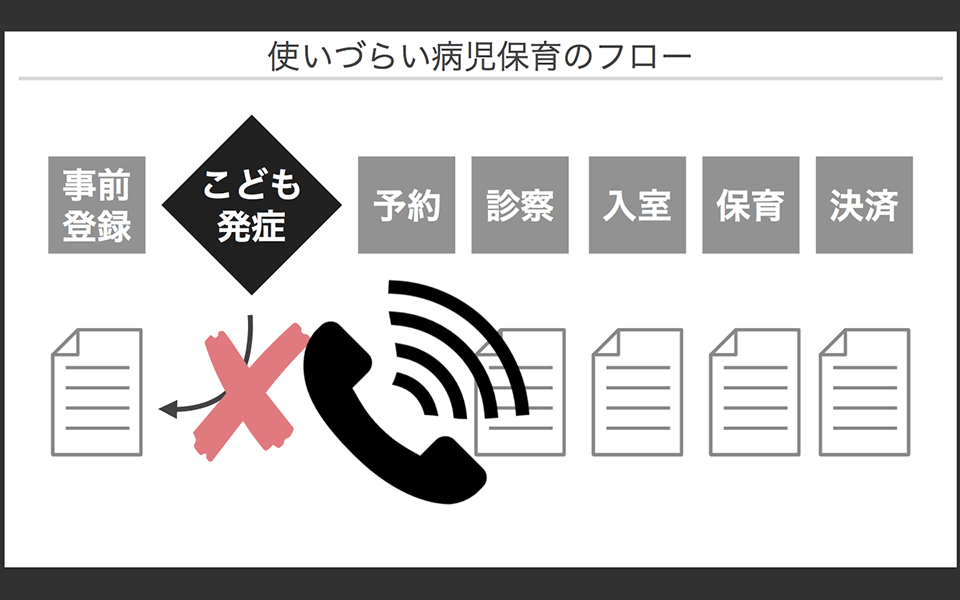
Sonoda:Even if registered, there are various hurdles to its use. For example, there is a large amount of paperwork involved in the reservation - payment process for a sick child care facility. And the most difficult part is to make a reservation to use the facility. More than 90% of the facilities accept reservations only by phone, and it is common for calls to go unanswered for 30 minutes or more in the morning. This is because calls from users are concentrated at certain times of the day, since reservations can only be made during the staff's work hours. For example, if a child has a fever the night before, the next day the staff will start calling at 7:00 a.m., and when they finally get through, if there is no vacancy, they will have to call another facility .......
Editorial:That is a very painful story for both the parents and the institution.
Sonoda:Even more problematic is the "cancellation rate" of these appointments on the morning of the day of the appointment, which ranges from 30% to 70%. Children's health conditions are changeable, and it often happens that a child has a fever the night before and makes an appointment for that day, but by the next morning the child is feeling better and can go to the daycare center. However, due to the phone situation described earlier, there have been many situations where cancellation calls have been difficult to connect, resulting in "no-show" cancellations. In addition, even after accepting cancellations, the day-care centers have a lot of work to do, such as contacting those on the waiting list to confirm the use of the day-care center. Furthermore, when the confirmation of use is received at the last minute, parents on the waiting list may have already taken time off from work to attend to the situation. In this way, people who wanted to use the center were unable to do so, and the facility also experienced a decline in utilization (i.e., no profit), which was a troubling situation.
Editorial:This is a really difficult situation. ...... By the way, do you always need to see a doctor in order to receive care for a sick child?
Sonoda:In order to receive care for a sick child, the child must be examined at a hospital and receive a document called a "Doctor's Contact Form. This document certifies the type of illness the child is suffering from, and its contents will determine whether the child will be cared for in the "isolation room" or the "general room" at the sick child care facility.
Purpose of the "portal site" on sick child care
Editorial: There really is a lot that is not known about sick child care.
Sonoda: Yes, we do. First of all, we will release the "Azukaruko-chan" portal site by July. On this site, we would like to provide parents with easy-to-understand information on "points to consider when using sick child care," "information on sick child care facilities throughout Japan," and "what kind of facilities sick child care facilities are. For example, some sick child care facilities are attached to hospitals and provide a one-stop service from doctor's visits to admission to the facility. In addition, there are also facilities for "sick children (children in the acute stage of illness. Children with high fever due to influenza, etc.) cannot be admitted, while "sick children (children in the convalescent stage, whose condition is stable but cannot go to the daycare center. There are also facilities that admit only "sick children (children with acute illnesses, such as those with high fever due to influenza)" and "post-ill children (children in recovery, such as those whose condition is stable but cannot go to daycare). However, such information cannot be found without searching municipal websites. So our portal site will make it easy to find information on such sick child care facilities in the neighborhood.
Editorial: This will be a great site for parents.
Sonoda: Another goal of the portal site is to "change the image of sick child care to a positive one. Until now, "sick child care" has had more than a few negative images. For example, "If you leave your child at a facility where sick children gather, he or she might catch other illnesses," or "Parents should take time off work to take care of their children when they are sick. However, in reality, sick children are cared for in isolated rooms in case of contagious diseases, and all areas that children's hands come in contact with (i.e., toys, etc.) are disinfected every day. We want you to know that all children's hands (=toys, etc.) are disinfected daily and that the same "standard precautions" for coughs, sneezes and runny noses are taken as in hospitals. In addition, although the sick child care facility system was started about 50 years ago to "support women's employment," I rather consider it to be a "child support" system. This is because at a sick child care facility, even if a child develops symptoms that cannot be treated at home, appropriate treatment can be given immediately by medical personnel. In addition, the facility can provide continuous care, which is a good environment in terms of development and growth. In other words, sick child care facilities are "a place for children," and as a result, they are also linked to "support for parents' employment. Therefore, we would like parents to think that by using a sick child care facility, they are not "sacrificing their children for their parents," but rather, they are "choosing the best environment for their children.
Where the online reservation service "Azukaruko-chan" aims to go
Editorial: I now know that "sick child care facilities" are wonderful facilities. ......
Sonoda: However, the problem is that such facilities are not fully used (i.e., the utilization rate is low). The reason, I repeat, is their "difficulty of use. To solve this problem, we are aiming to release "Azukaruko-chan," an online reservation service for sick childcare, at the same time as the portal site.

Editorial: What kind of service is this?
Sonoda:We are currently in the process of testing the system with a number of sick child care facilities and their guardians, and the basic mechanism is as follows. Azukaruko-chan has a map like the one shown below, which displays the status of nearby sick child care facilities as "fully booked" or "available". By selecting the icon of the facility, you can make a reservation.
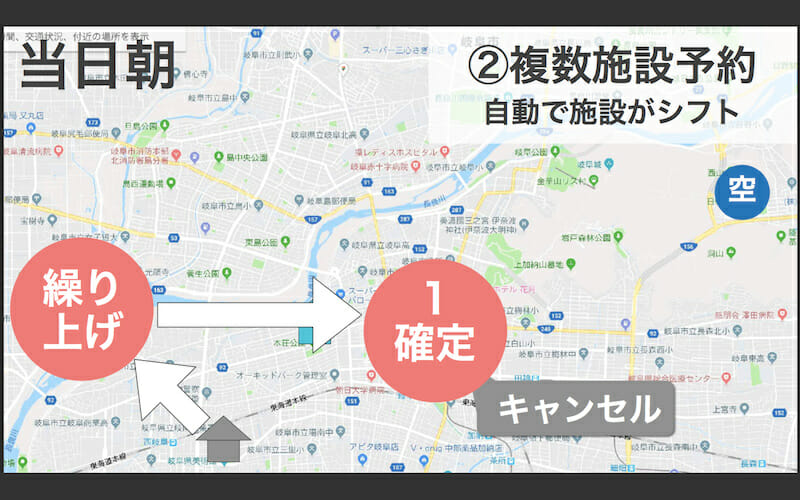 Map of Azukaruko-chan facilities (image)
Map of Azukaruko-chan facilities (image)
Editorial:So you don't have to call them anymore!
Sonoda:That's right. The point is that you can "wait-list" for a facility that is full and also reserve another facility. If the facility you were on the waiting list for becomes available by the specified time, your reservation is automatically transferred to that facility, and the other facility you were on the waiting list for is notified of your cancellation. The other facility will be notified of the cancellation, and the waiting list for the cancelled facility will be moved up to the waiting list for the other facility as well. This ICT-based reservation coordination system is designed to improve the utilization rate of sick child care facilities in the region as a whole. In addition, "Azukaruko-chan" provides a medical questionnaire using LINE, which reduces the burden of paperwork when entering a sick child care facility. This also has the advantage for the facility to know in advance the symptoms of the child entering the facility and to be able to accept the child smoothly.
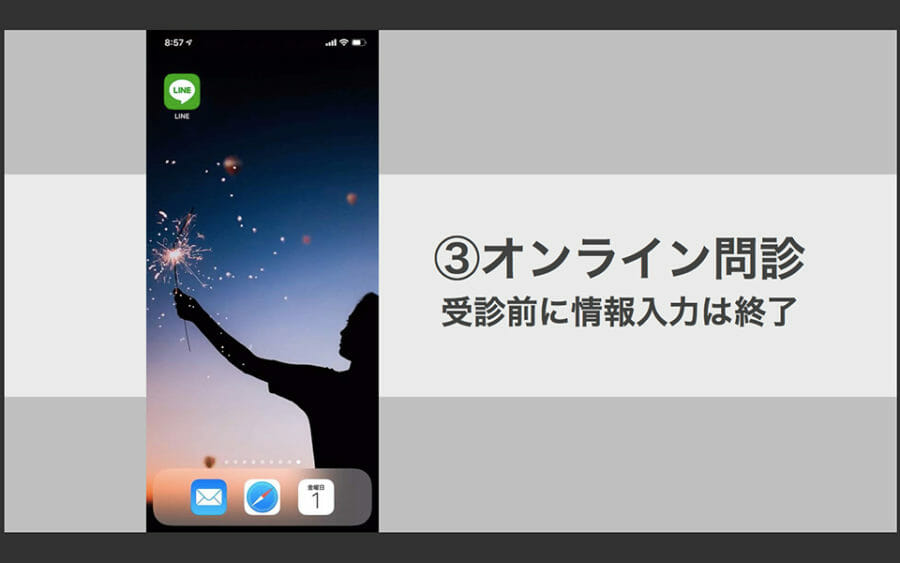
Sonoda:In the ongoing demonstration test, we have received feedback from concerned parties such as "I am glad I don't have to make phone calls anymore," "I appreciate that reservations can be made 24 hours a day, 7 days a week," and "The advance information input is very helpful. The business model is that there is no charge for parents to use the system, while the sick child care facility or the municipality pays a fee for the use of the system. Currently, 60-70% of sick child care facilities are unprofitable, and we would like to operate the system by contracting with municipalities that are the outsourcing providers. This is because the enhancement of sick child care coincides with the government's mission of creating an "attractive town for the child-rearing generation," and once a contract is concluded with the municipality, all parents in that area will be able to use "Azukaruko-chan" at all facilities.
How "Azukaruko-chan" was born
Editorial: What prompted Mr. Sonoda to start this initiative?
Sonoda: What prompted me to get involved in childcare for sick children was the "postpartum depression" and "parental abuse" that I faced in the field as an obstetrician/gynecologist. To solve such problems, we need to "change our lives," but I realized that there was really not much I could do in my capacity as a physician (i.e., a specialist in curing diseases). In the midst of these concerns, I came across the study of "public health," which I studied in graduate school. In a nutshell, it is "the study of how to improve the well-being of society as a whole," and it gave me a way of thinking that was the exact opposite of that of doctors in the field, who basically have a one-on-one relationship with their patients. In other words, in solving "postpartum depression" and "abuse," the idea of working to change "society as a whole" rather than "on an individual basis" was born. As an obstetrician/gynecologist, I was able to talk directly to many mothers, and one story that strongly moved me was "Every time my child got sick, I had to take more and more time off work, and as a result, I had to quit my job. It was very hard. ...... This made me think, "Isn't there something wrong with the structure of society in the first place?" I began to think that the structure of society was wrong in the first place, and I wanted to change it. I also learned of the existence of "sick child care facilities" from a friend who has a child and who said, "sick child care facilities are really hard to use," and I thought that this would be the key to solving the problem. I was also able to take the plunge into entrepreneurship thanks to an NPO I was participating in at the time called IHL (Institute for Healthcare Leadership), where I had the opportunity to spend a year studying this issue with a wonderful group of people including venture capitalists, IT company executives, doctors, midwives, nurses, and pharmacists.
What is the future of "Azukaruko-chan"?
Editorial: What do you think of the future development of "Azukaruko-chan"?
Sonoda: The three issues I see in the "sick child care" market are "not well known", "low utilization rate of facilities", and "still few facilities". As for the first two issues, "portal sites" and "online reservation services" are the solutions, and as for the "lack of facilities," I will write a paper around August this year to appeal to municipalities nationwide, saying that the current number of sick child care facilities is insufficient when the number of potential users is estimated. We are planning to appeal to municipalities nationwide. The portal site to be released in July of this year is intended to cover all facilities nationwide, and the reservation service will mainly focus on facilities in Tokyo and other parts of the Kanto region. The "online reservation service" can also be introduced remotely, so we would like to hear from sick child care facilities in remote areas as well.
Editorial:What is the current structure for addressing these issues?
Sonoda:Currently, in order to realize the "Azukaruko-chan" initiative, we have the cooperation of many people, including pediatricians, engineers, childcare specialists for sick children, and pro bono (professionals who volunteer to contribute to society, e.g. designers, consultants, programmers, etc.). We are currently working with many people to make the "Azukaruko-chan" project a reality, including pediatricians, engineers, sick child care specialists, and pro bono (professionals who volunteer to contribute to society, e.g. designers, consultants, programmers, etc.). We also have the cooperation of the National Council for the Care of Sick Children and sick child care facilities, which is one of our greatest strengths. In addition to various forms of cooperation between industry, government, and academia, we are also launching a crowdfunding campaign in April. This is not only for the purpose of fundraising, but also for public relations purposes to let people around the world know about the social issue of "sick child care," and most importantly, to solve this issue together with the help of many people.
Editorial:It seems that the number of places to collaborate will continue to expand.
Sonoda:Eventually, we would like to collaborate with daycare centers as well. For example, if a child at a daycare center develops a fever during the day, we would like to make it possible for the child to go to a sick child care center without the parent's attendance. We would like to involve companies in this project. This is because if the "collaboration of sick child care" is promoted, it will be beneficial to the company as well, as it will solve situations such as employees who are raising children being called out suddenly or remote workers having to take care of their children while they work. In this way, we would like to work with various stakeholders to create a network where children can grow up with peace of mind.
<After the interview
The analog and inefficient "reservations are made by phone only" method has prevented many from taking advantage of the wonderful resource that is sick child care facilities, and many have had to take time off work. The result is what Ms. Sonoda describes as "It's not everyone's fault. And yet, everyone is having a hard time. I believe that a solution utilizing smartphones and LINE, which are becoming popular among the generation of parents, is exactly what the times are calling for. As one of the parents with a child about to start attending preschool, I hope that the company's efforts will spread nationwide as soon as possible.

